- Home
- Chaim Potok
In the Beginning Page 13
In the Beginning Read online
Page 13
She closed the door softly.
I stood there for a moment, staring at the closed door. Then I went wearily up the stairs to our first-floor apartment. My mother was at the kitchen table, writing letters. I lay down on my bed.
Later my father came home exhilarated over a sale he had made that day. We ate dinner and he talked about the sale. “And do you know what went on in the market today, Ruth?” He heaped sour cream on his baked potato, dug at the potato with his fork, sniffed, and ate.
My mother stared down at the food on her plate. She seemed not to have heard anything he had said. “I was thinking of the beech trees and the boxwood in the forest behind the farm,” she murmured. “Can you remember them at this time of the year?”
He stopped chewing. “Yes.” His voice was low.
“Will Bader be able to go to Lemberg?” she asked after a pause.
“Bader is on his way to Switzerland. It depends on what happens at the conference.”
My mother looked down at her plate.
“What conference, Papa?”
He glanced at me, annoyed that I had interrupted his conversation with my mother. “A Zionist conference. Eat your fish, David. Fish gives brains. You have not touched your fish.”
“The beech trees are especially beautiful now,” my mother said. “The color of the bark in the sunlight. I remember.”
Afterward she sat in the living room and listened to the canary singing. And in the night I lay awake and heard them speaking in Yiddish of summers in Lemberg and Bobrek, of forests and rivers, of Poles and Cossacks, and of my father’s dead brother. I had dreams that night but could remember none of them when I woke with a sore throat in the morning.
It was a mild sore throat. There was no pain behind my eyes. My mother sat at the kitchen table, writing letters. I looked at the envelopes she had addressed and saw the word Poland. I said the word inside my head, imitating her pronunciation of the letters. My brother played quietly on the kitchen floor. I went downstairs to get my tricycle and discovered that the front tire had been cut clean through to the rim.
I stared at the tire. Part of it lay on the floor of the hall, a black ribbon of dead rubber; the rest of it was still on the wheel. As I rolled the tricycle backward with my hand on the handlebar, the rest of the tire came off and lay twisted and vaguely reminiscent of the excrement left behind on the sidewalk yesterday by Mrs. Horowitz’s dog.
I went back upstairs.
My mother came downstairs with me and looked at the tire. She seemed weary.
“Why should anyone do that?”
I told her about Eddie Kulanski’s hand. “It was an accident, Mama.”
She regarded me with a strange dark look in her eyes. “We will tell your father when he comes home,” she said. “I must finish my letters and make Shabbos.” She brought the tricycle upstairs to my room. It stood in the corner near my dresser, looking crippled. And yesterday it had been so alive. What I had done to Eddie Kulanski had been an accident; but this had not been an accident. Someone had deliberately cut it. Eddie Kulanski and his cousin had wanted to hurt me; I had not wanted to hurt Eddie Kulanski. But I had not expected anyone to cut it. When you didn’t expect something to happen and it happened, that was also an accident. My Cousin Saul had said that to me once. Whoever cut the tire of my tricycle had caused me to have an accident. I hated the dry, cold, helpless anger I felt.
I came outside into the morning and sat down on the stoop. It was a warm day. Tony Savanola and Eddie Kulanski were playing marbles. Leaning against the tree near the curb was Eddie Kulanski’s cousin. He just stood there, leaning his shoulder against the tree and looking at me. There was a little smile on his small lips. He kept looking at me and smiling. After a while I got up and walked along the street to Mr. Steinberg’s candy store. I stood at the newsstand for a few minutes, searching out familiar letters and words on the front pages of the Yiddish newspapers. Then I walked along the narrow side street toward the boulevard and the zoo. I stopped in front of the window of a bakery shop and stared at a chocolate cake. As I turned my head, I noticed Eddie Kulanski’s cousin coming slowly up the block toward me.
I stood very still near the window of the bakery shop. Eddie Kulanski’s cousin passed very close to me; he seemed about to push me against the window of the shop. But he did not touch me. He went by me and on down the street. At the corner he turned into the boulevard. A moment later, he turned back into the side street and started toward me once again. I walked quickly back along the street into my own block. My legs were trembling. I sat down on the stoop. He came up to the tree in front of the house and stood there, leaning against the maple and smiling vaguely. Eddie Kulanski and Tony Savanola were playing quietly together. Joey Younger was not on the street. After a moment Eddie Kulanski’s cousin withdrew a pocketknife from his trousers. He opened the blade. It was a small knife with a red handle. At the base of the maple were large, gnarled protrusions of roots. He proceeded to toss the knife into one of these roots. The knife would enter the root and remain upright, quivering. I watched him handling the knife. After a while I went upstairs and lay down on my bed.
My mother said nothing about the tricycle during lunch. She moved about the kitchen feeding me and my brother, but from the drawn and dreamy look on her face and in her eyes I knew she was elsewhere. I ate quickly. I did not like to be with her when she was near me and not near me at the same time.
After lunch I went back to my room. There was a vague scratchy sensation in my throat. I lay down on my bed and covered my eyes with my hands. The doorbell rang. I heard my mother’s footsteps in the hallway. The door was opened. A moment later it was closed. I heard a voice and my mother’s quiet response. I could not make out the words. Outside my open window a horse and wagon clattered by on the cobblestones. I heard the voices of children playing on the sidewalk. I thought I would go downstairs and sit in the sun. But I could not move from the bed; I had no will to move. The whispered conversation continued for a while in the hallway of our apartment. Then the door opened and closed again. I lay on my bed wondering what my mother and Mrs. Horowitz had talked about.
I got down off the bed and went through the dining room into my parents’ bedroom. It was a large sunny room, with twin beds, a dark mahogany bureau with a huge mirror, a tall dark chifforobe, and drapes over the two windows. The drapes had been opened and sunlight filled the room. I went to the little bookcase near my father’s bed and removed his prayer book. On the wall opposite the beds hung my parents’ wedding picture. It was a large, oval-shaped, sepia photograph framed in dark wood. My father wore a tuxedo, my mother had on a white gown. A crown of lace topped by a veil covered her hair. She looked very beautiful, and my father looked filled with softness and warmth. The photograph was a three-quarter view of their faces, and they were both staring off at something distant from them, their eyes limpid, dreamy. They seemed lost in private memories. It occurred to me that I did not even know how long they had been married. I stared at the photograph and tried to read their eyes. It’s like freezing someone, I thought. People do things and think thoughts before and after a picture is taken; but the picture freezes them and we have to try to know what they thought about and did before and after the picture. My parents did not look so nice now as they did in the picture. My mother was always tired; my father was always stiff and often angry. What had they been like before the picture? I took the prayer book to my room and spent the rest of the afternoon looking at it on my bed, finding letters and words that were familiar to me. When my father came home I went quickly into my parents’ bedroom and slipped it back into his bookcase.
“How do you know it was Eddie Kulanski who did it?” he asked me brusquely after my mother had spoken to him. “You saw him do it?”
“No, Papa.”
“Then you may not say that he did it. A hooligan may have done it. I will have the tire repaired next week. We will keep it in the apartment from now on. I will bring it down in the morning and t
ake it upstairs when I come home.”
I was quiet.
“And be careful how you ride it. If you ran over my hand, I would not like it too much myself. I need to start getting ready for Shabbos. Was there any mail today, Ruth?”
There had been a letter from a cousin in Lodz and a friend in Lemberg. No mail had come from anyone in my mother’s family that day.
My father frowned and went off to the bedroom.
“Is my grandmother still sick, Mama?”
“I don’t know, darling. We’re waiting to hear.”
“But the medicine was supposed to help her, Mama.”
“It did help her. But she’s old and very tired.”
“Will she be able to come to America?”
“I don’t know, darling. We hope so. We’ll know in one or two months.”
“Will you ask Mrs. Horowitz to make a special prayer for your mama to come to America?”
“I don’t know what to do,” she murmured. “I don’t know. I don’t know.” Then she said, “Why don’t you go with Papa to synagogue for Kabbolas Shabbos?”
“I don’t want to go outside anymore today, Mama.”
She sighed and went into the kitchen.
I went back to my room and lay on my bed and watched the afternoon wane. I looked through my window at the tree and the sky and kept seeing the knife striking and entering the maple and remaining upright, the blade in the root, all of the knife quivering. If someone took a photograph of the knife, it would not show the knife quivering. It would freeze the knife. But it was the quivering that I remembered most about it. I closed my eyes and lay very still on my bed and watched the quivering movements of Eddie Kulanski’s cousin’s knife.
As always, we ate our Shabbat meal that evening in the dining room off the kitchen. As always, I sat quietly listening to my parents talk about their friends, their plans, their lives in Poland. And, as always, it was as if I were not there much of the time.
I sat to my father’s right and across from my little brother, who was dribbling soup on the wooden table of his high chair and disintegrating the large piece of braided bread my mother had given him to render him silent after my father had chanted the Kiddush and made the blessing over the challah. My father, wearing a suit and collar and tie, had begun to eat hungrily, peppering his soup and finishing it off quickly. He was working on the chicken foot that had accompanied the noodles as part of the furniture of the soup when my mother, who had been eating slowly and moodily, said, “Perhaps we could give the doctor a gift.”
My father stripped the meat off another finger of the foot, sucked on the small bones, spat them into his plate. “With Americans you do not play games. They are not like Polaks. All the families would be here already if Americans were like Polaks. Everyone says to me never to dare play games with American immigration. So we will wait. They will come, Ruth. She will be cured soon, and they will all come. I promise you.”
“From your mouth into God’s ears,” she said, and rose, gathered up the soup plates, and went into the kitchen.
“They will be here for the new year,” he said to her, speaking in the direction of the open doorway that led to the kitchen. “They will certainly be here for Pesach.” He hesitated, and added, “If she does not deliver any more babies in the snow.”
“It was a matter of saving a life, Max.”
“That life is now preventing Jews from leaving Poland.”
“And it was a goy. If she had refused and the woman had died, there would have been trouble.”
“That I can understand,” he muttered. “Tulchin I understand. I despise that mentality. But I understand it.”
“It was her bad luck, Max.” She came back into the dining room with a chicken platter in one hand and a serving dish of sweet potatoes in the other. “The stars were bad for her that month.”
“An old woman in a snowstorm would get sick even with good stars, Ruth. Why are you talking nonsense?”
“No, Max. I know a little about such things.”
“All right. Let it be that way.”
“I looked into it with Mrs. Horowitz.”
He made a face.
“If it had not been the snowstorm, something else would have happened. It was not a good month for my mother, Max.”
“All right, Ruth. I heard the first time. The chicken needs salt.”
“Alex, darling, don’t throw your challah all over the floor. Here is some chicken. Eat some chicken for Mama.”
My father was stripping the meat off a drumstick with his knife and fork. “All week long people are telling me it was a good meeting last Sunday. The closest to the old meetings.”
“Nothing can be like the old meetings,” my mother said.
“The closest, they said. Not exactly like them. The closest.”
“It was a good meeting, Max. But the trees were different.”
“The Bronx is not Galicia. You discovered America.”
“Please don’t be sarcastic, Max. I didn’t mean anything bad.”
He put down his knife and fork and looked at her. There was a moment of brittle silence. Then, slowly, he picked up his fork and continued eating. I saw the muscles working in his jaws and neck.
My mother bent over her plate, her elbows on the table, eating without appetite. The down of hairs on her forearms seemed darker than usual below the white lacy edging on the sleeves of her pale blue dress. A film of perspiration lay across her forehead and beneath the faint dark hairs on her upper lip. There was a gray pallor to her face. Sunday she had appeared well and happy; now she seemed ill. She was with her father and mother on the farm outside Bobrek. Her moods were the barometer of their distant state of being. I tried to imagine what her mother might look like. I saw a wrinkled old lady in a long dress and a shawl. I could not imagine her face. There were no photographs of either my father’s or mother’s parents in our house: they had never let themselves be photographed.
The flames burned steadily on the four white candles that stood in tall silver candlesticks in the center of the cloth-covered table. I loved looking at the flames. They burned blue and yellow around the wicks and sometimes they burned white. Now they were very pale blue and light golden yellow, edging faintly into red whenever a breeze from the evening street came through the open window. The Havdalah candle had a different flame. What did my mother murmur as she kissed my forehead after Havdalah? A special prayer for a good memory that had been given her by Mrs. Horowitz? I shuddered. I felt vaguely unclean thinking that a special prayer by that woman was being spoken upon my forehead by my mother. Why did my mother need prayers from her? Weren’t there enough prayers in the prayer book? And there was the small flame that burned in a tall glass filled with white wax; all through the ten days between Rosh Hashanah and Yom Kippur it burned, on the shelf in a corner of the kitchen above the icebox, away from the window and sudden draughts of air. My mother seemed to need the flames of candles; shadows frightened her. On Shabbat especially she tried to avoid stepping into the shadows that collected in some of the corners of our apartment as the day paled and evening came on.
Someone was speaking to me but I could not remove my eyes from the flames. Finally my father’s voice penetrated the warm brightness.
“Why don’t you eat?” I heard him say. “Why do you sit there like a golem?”
I took my eyes from the flames and looked at him. His squarish features and thick shoulders and neck, together with his dark suit, white collar, and dark tie, gave him a stark appearance. He seemed carved of wood rather than made of flesh. That Shabbat evening I realized that I did not truly know who he was, and I remembered that in some of the dreams I had been having he had appeared as a darkly red apparition, gargantuan, terrifying; that in the recesses of my memory lay horrors I could dimly sense but not see; and I shuddered.
“Eat,” my father said. “Your eyes will fall out of your head, the way you stare at the candles.”
“Some believe it strengthens the eyes,”
my mother said meekly.
“What strengthens the eyes?”
“To stare at candles.”
“Who believes?”
“I heard it somewhere.”
“Eat,” my father said to me. “You are so skinny soon the wind will blow you away.”
“She has a library,” my mother said.
“What?”
“Two walls of books. Left by her father.”
“What books?” She told him.
He sat very stiffly in his chair and looked at her. “You saw those books?”
“No. She herself told me about them. I have not been inside her apartment.”
“Books against the goyim,” he muttered. “Books of magic? Is that what she said?”
“Yes.”
“God in heaven, Ruth. Why do you have anything to do with her?”
“She is a lonely old woman. Her only son refuses to see her.”
“The son is doing a wrong. He is violating a commandment of the Torah. But we do not need such books to help us.”
“What can it hurt, Max?”
“It violates the Torah.”
“In Bobrek there were Hasidim who did what she is doing.”
“Hasidim.” He spoke the word with contempt. “They have the souls of day-old sheep.”
“Sometimes the rabbi in Bobrek made a charm.”
“The rabbi in Bobrek was a superstitious fool. Better a man like Bader who is a man of the world and can also learn than a bearded shut-in with the brain of a genius and the soul of a calf. Are we done eating? Is there dessert? Finished already, David. Do you think I want to sit here all night watching you eat a piece of boiled chicken that would leave the canary hungry?”

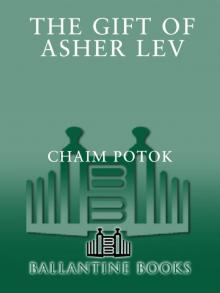 The Gift of Asher Lev
The Gift of Asher Lev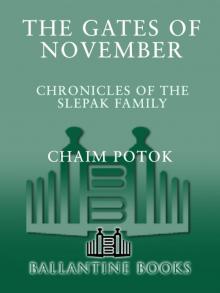 The Gates of November
The Gates of November In the Beginning
In the Beginning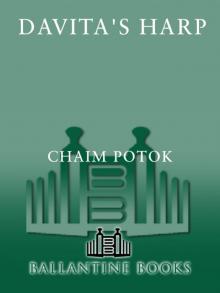 Davita's Harp
Davita's Harp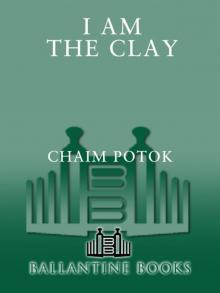 I Am the Clay
I Am the Clay The Promise
The Promise The Chosen
The Chosen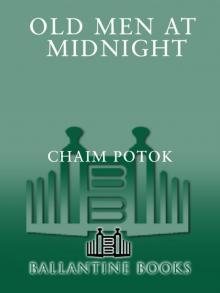 Old Men at Midnight
Old Men at Midnight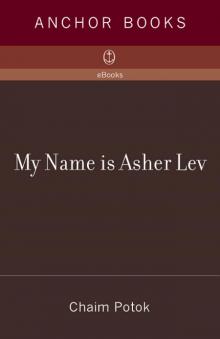 My Name Is Asher Lev
My Name Is Asher Lev